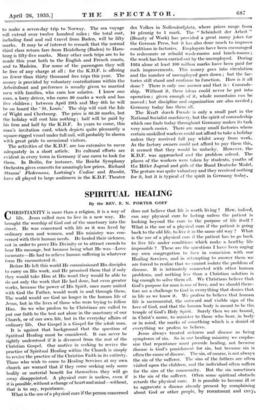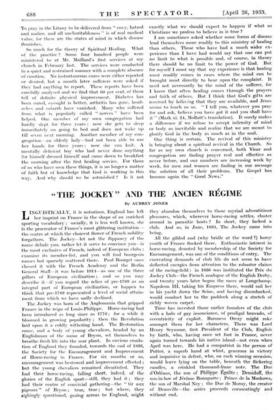SPIRITUAL HEALING
By the REV. E. N. PORTER GOFF CHRISTIANITY is more than a religion, it is a way of life. Jesus called men to live in a new way. He brought the worship of God out of the sanctuary into the street. He was concerned with life as it was lived by ordinary men and women, and His ministry was con- cerned with their human needs. - He healed their sickness, not in order to prove His Divinity or to attract crowds to hear His message, but because being what He was—Love incarnate—He had to relieve human suffering in whatever form He encountered it.
Before He left this world He commissioned His disciples to carry on His work, and He promised them that if only they would take Him at His word they would be able to do not only the work that He had done,- but even greater works, because the power of His Spirit, once more united with God the Father, would work in and through them. The world would see God no longer in the human life of Jesus, but in the lives of those who- were trying to follow Him. So- we who profess to be Christians are called to put our faith to the test not alone in the sanctuary of our Church, or of our own life, but in the everyday affairs of ordinary life. Our Gospel is a Gospel for the whole man.
It is against that background that the question of Spiritual Healing must be considered. - It can never be rightly understood if it is divorced from the rest of the Christian Gospel. Our motive in seeking to revive the practice of Spiritual Healing within the Church is simply to revive the practice of the Christian Faith in its entirety. Those who wish to come to Healing Services at my own church are warned that if they. come seeking only some bodily or material benefit for themselves they will go away disappointed. A physical cure is useless, even if it is possible, without a change of heart and mind—without, that is to say, repentance.
What is the use of a physical cure if the person concerned does not believe that life is worth living ? How, indeed, can any physical cure be lasting unless the patient is looking beyond the cure to the purpose of life itself ? What is the use of a physical cure if the patient is going back to the old life, to live it in the same old way ? What is the use of a physical cure if the patient has to go back to live life under conditions which make a healthy life impossible ? These are the questions I have been urging my own congregation to face in connexion with our Healing Services, and in attempting to answer them we are forced to realize that we cannot isolate the problem of disease. It is intimately connected with other human problems, and nothing less than a Christian solution is big enough to solve them all. We Christians believe that God's purpose for man is one of love, and we should there- fore see a challenge to God in everything that denies that in life as we know it. We profess to believe that human life is sacramental, the outward and visible sign of the love of God, and that the human body is meant to be the temple of God's Holy Spirit. Surely then we are bound, in Christ's name, to minister to those who bear, in body or in mind, the marks of something which is a denial of everything we profess to believe.
Jesus always treated sickness and disease as being symptoms of sin. So in our healing ministry we empha- size that repentance must precede healing, not because disease is God's punishment for sin, but because sin is often the cause of disease. The sin, of course, is not always the sin of the sufferer. The sins of the fathers are often visited upon the children, and the individual often suffers for the sins of the community. But the sin sometimes is the sin of the -sufferer. Often some spiritual obstacle retards the physical cure. It is possible to become ill or to aggravate a disease already present by complaining about God or other people, by resentment and envy, To pray in the Litany to be delivered from " envy, hatred and malice, and all uncharitableness " is of real medical value, for these are the states of mind in which disease flourishes.
So much for the theory of Spiritual Healing. What of the practice ? Some four hundred people were ministered to at Mr. Maillard's first services at my church in February last. The services were conducted in a quiet and restrained manner with a complete absence of emotion. No instantaneous cures were either reported or desired, but a month later sufferers were asked if they had anything to report. These reports have been carefully analysed and we find that 60 per cent. of them tell of definite physical improvement. Diabetes has been cured, eyesight is better, arthritis has gone, head- aches and catarrh have vanished. Many who suffered from what is popularly called " nerves " have been helped. One member of my own congregation had hardly slept for three years : now she gets to sleep -immediately on going to bed and does not wake up till seven next morning. Another member of my con- gregation—an elderly lady—had • not been able to use her hands for three years : now she can knit. A -mentally deficient boy who had never done anything for himself dressed himself and came down to breakfast the morning after the first healing service. For those of us who have seen these things, it is no longer a matter of faith but of knowledge that God is working in this way. And why should we be astonished ? Is it not exactly what we should expect to happen if what as Christians we profess to believe in is true ?
• I am sometimes asked whether some forms of disease lend themselves more readily to this ministry of healing than others. Those who have had a much wider ex- perience than I have .had would say that one can put no limit to what is possible and, of course, in theory there should be no limit to the power of God. But for myself I must say that 'my experience is that healing most readily comes in cases where the mind can be • brought most directly to bear upon the complaint. It need not necessarily be the mind of the sufferer, for I know that often healing comes through the prayers and faith of others. But I think that God's gifts are received by believing that they are available, and Jesus seems to teach us so. " I tell you, whatever you pray for and ask, believe you have got it and you shall have it " (Mark xi. 24, Moffatt's translation). It surely makes a difference if we refuse to accept infirmity of mind or body as inevitable and realize that we are meant to glorify God in the; body as much as in the soul: One thing is certain. The revival of this ministry is bringing about a spiritual revival in the Church. So far as my own church is concerned, both Vicar and congregation are finding prayer real and effective as never before, and our numbers are increasing week by week, for men and women are finding in our message the solution of all their problems. The Gospel has become again the " Good News."











































 Previous page
Previous page